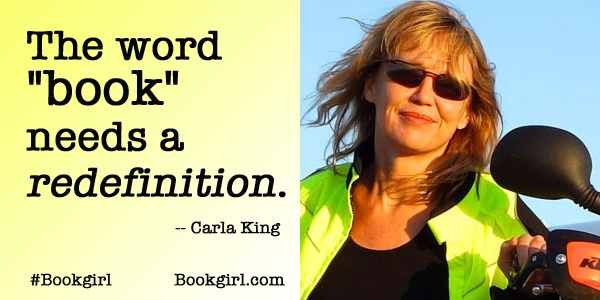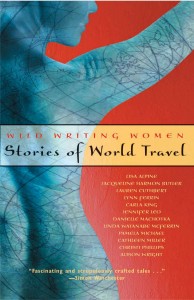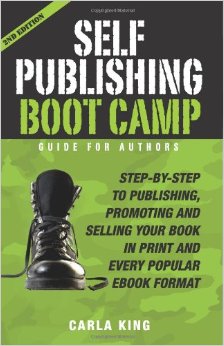 NAME: Carla King
NAME: Carla King
TITLE: Founder, Self-Pub Boot Camp
COMPANY NAME: Misadventures Media
WEBSITE: http://selfpubbootcamp.com
Bookgirl recently interviewed Carla King, author and self-publishing expert. Carla provides smart, straight-forward information on how to self-publish books. Sign up for Carla’s Virtual Self-Publishing Boot Camp: A Conference on Your Desktop!
Bookgirl: How would you describe your experience with book publishing over the years? When and why did you start focusing on self-publishing?
 Carla: My first experience with book publishing, was briefly frustrating. It didn’t take me long—like about a month—to figure out that with my skills as a tech writer in Silicon Valley I could easily do it myself. After that I was unstoppable, even though self-publishing was still stigmatized. It was 1995, and I had just returned from Europe, and I created my bicycling guidebook in Word, got an ISBN, a graphic designer for the maps, and a cover designer. I printed my first book, made enough money to return to France, and sold it to tourist offices, bicycle shops, and English-language bookstores.
Carla: My first experience with book publishing, was briefly frustrating. It didn’t take me long—like about a month—to figure out that with my skills as a tech writer in Silicon Valley I could easily do it myself. After that I was unstoppable, even though self-publishing was still stigmatized. It was 1995, and I had just returned from Europe, and I created my bicycling guidebook in Word, got an ISBN, a graphic designer for the maps, and a cover designer. I printed my first book, made enough money to return to France, and sold it to tourist offices, bicycle shops, and English-language bookstores.
Traditional publishers didn’t want my guide; they said it was too small, too niche. It’s interesting because today it’s agreed that niche books are the most successful, especially in nonfiction. I told them I didn’t understand why somebody would want to buy a book on bicycling the entire country of France when they only wanted to bicycle in the south? Well, back then they had production considerations, standard book sizes, and manufacturing restrictions. It just didn’t fit into their idea of what a successful book could be. They were wrong.
In the mid 2000’s I started seeing some development of self-publishing tools. BookSurge, for example, was later bought by Amazon and became CreateSpace. In 2008, Mark Coker founded Smashwords and in 2010 things really took off. It was clear that self-publishing would become a profitable industry. I was glad to see that, and also amused at all the controversy around it with traditional publishers and many authors railing against it.
However, it didn’t take long for many of those same authors to come to me for help saying that the publishers they had defended had abandoned them. Many of those authors have now succeeded in self-publishing, but many are still struggling, unable to handle marketing themselves. Marketing is undeniably the most difficult part of indie publishing, and it’s only now that I’m seeing somewhat reasonably priced marketing and publicity services cropping up to help authors. That’s because it’s not turnkey, not a one-size-fits-all proposition. Finding the right marketing and publicity professional, someone who is reputable and reasonably priced, is hard!
 Bookgirl: What are some of the books you’ve self-published?
Bookgirl: What are some of the books you’ve self-published?
Carla: Books I’ve self-published include Cycling the French Riviera, Wild Writing Women: Stories of World Travel, Stories from Elsewhere, American Borders, and The Self-Publishing Boot Camp Guide for Authors.
I have to say though that the word “book” needs a redefinition. The book as we have known it has been defined by the traditional publishing industry’s standards for manufacturing and pricing: a certain number of pages, book sizes and materials. Because many books are not necessarily delivered in print format they do not have to adhere to those standards. So a book can be of any length, delivered on a variety of devices, and contain text, images, audio and video. So I would say that I’ve self-published many more “books” than listed above.
This topic often comes up when I’m helping authors who have books that are very long or very short. They worry about book length because of those old standards. It’s true that many self-publishing authors—especially those with memoirs—tend to go on too long and they don’t get good editing to make the story really tight. But others have stories that are incredibly compelling that just don’t fit the restrictions of print-formatted books. For example, take a look at Haruki Murakami’s book, 1Q84. The book had to be published in three printed volumes, but I read it in ebook format and it was so compelling that I didn’t even realize how long it was.
It’s difficult to break out of the mindset of what a book is. I think that once we do, we’ll see some very interesting creations being published as books.
Bookgirl: What are some resources that you offer aspiring writers and authors?
Carla: I offer a lot of free resources on my site and some inexpensive digital downloads, too. The Self-Pub Boot Camp educational program helps authors choose and implement a publishing strategy. Over the years I’ve gathered a team of respected leaders in the industry to teach authors about every aspect of the business so they can do it themselves or successfully hire out tasks. The program is a digital download and authors can listen or watch on their computers or mobile devices. Basically it’s a self-publishing conference on your desktop. I also occasionally direct authors in a small-group program using Google Hangouts. They love the accountability. Finally, I offer a day-long workshop in San Francisco every February. In 2015 this may become a two-day program. Stay tuned!
Bookgirl: What are a few key things people should keep in mind if they want to self-publish a book?
Carla: I see a lot of self-publishing authors shooting themselves in the foot because they’re in too much of a hurry. Just because you can publish quickly doesn’t mean you should. I call it “the embarrassment of premature distribution.” It can result in poor quality books riddled with copy editing errors and bad cover design.
There are lots of ways to “beta” publish on your own website and blog, and with tools like LeanPub, before you commit to big distribution. When the book has been proven by beta readers, then it’s time to go to Amazon, Smashwords, IngramSpark, BookBaby, Vook and others to make it available to the general public.
Bookgirl: What are common mistakes you see aspiring and new authors make?
Carla: Besides premature publishing, the biggest mistake authors make is not buying their own set of 10 ISBNs directly from Bowker so that they can move their book to any service they like. Too many times authors get trapped in a service and then they have to retire the book, take it out of print, get new ones, and start all over again. This can cause havoc on Amazon and elsewhere, because the title will be listed as out of print for a while…maybe for a long time. A used printed book can also be sold by third parties on Amazon, further confusing the customer. I see authors rushing and I want to tell them, “please reconsider your deadline.”
Bookgirl: Where can people sign up for your self-publishing boot camp and what can they expect to learn from it?
 Carla: Authors can download the Self-Pub Boot Camp program at SelfPubBootCamp.com or sign up for any of the virtual or physical programs as they come up. I have an email newsletter that offers a lot of educational material for free and also alerts authors to events. In the program they learn literally every aspect of indie-publishing. Whether authors are doing it themselves or hiring out tasks, it allows them to make smart decisions and avoid expensive mistakes. They are also invited to join a private group that I monitor for any urgent questions. And I publish a list of books by authors in the program on my site. I’m proud to say that every single one of “my” authors have 4 and 5 star reviews on Amazon!
Carla: Authors can download the Self-Pub Boot Camp program at SelfPubBootCamp.com or sign up for any of the virtual or physical programs as they come up. I have an email newsletter that offers a lot of educational material for free and also alerts authors to events. In the program they learn literally every aspect of indie-publishing. Whether authors are doing it themselves or hiring out tasks, it allows them to make smart decisions and avoid expensive mistakes. They are also invited to join a private group that I monitor for any urgent questions. And I publish a list of books by authors in the program on my site. I’m proud to say that every single one of “my” authors have 4 and 5 star reviews on Amazon!
Sign up for Carla’s Virtual Self-Publishing Boot Camp: A Conference on Your Desktop!




